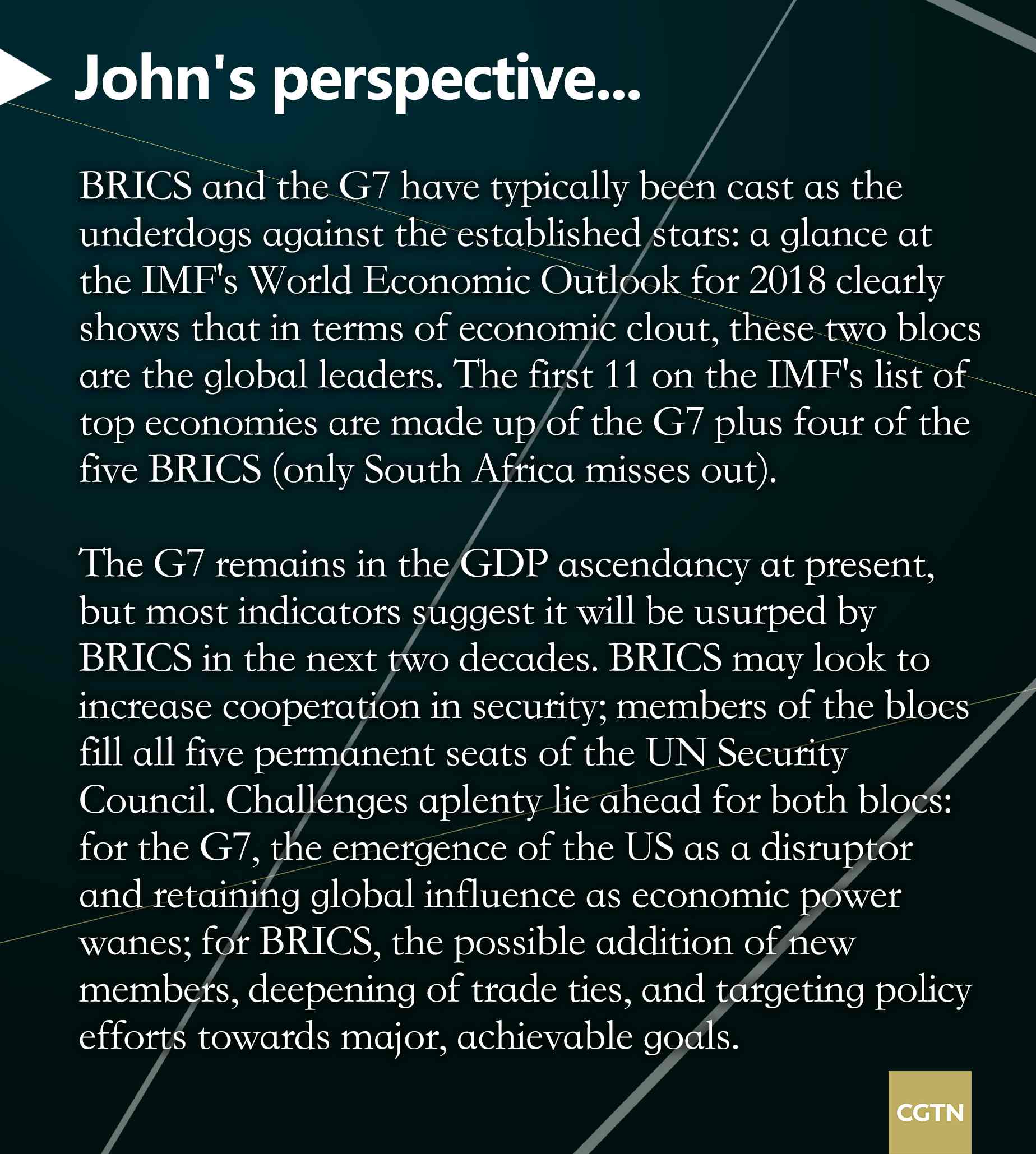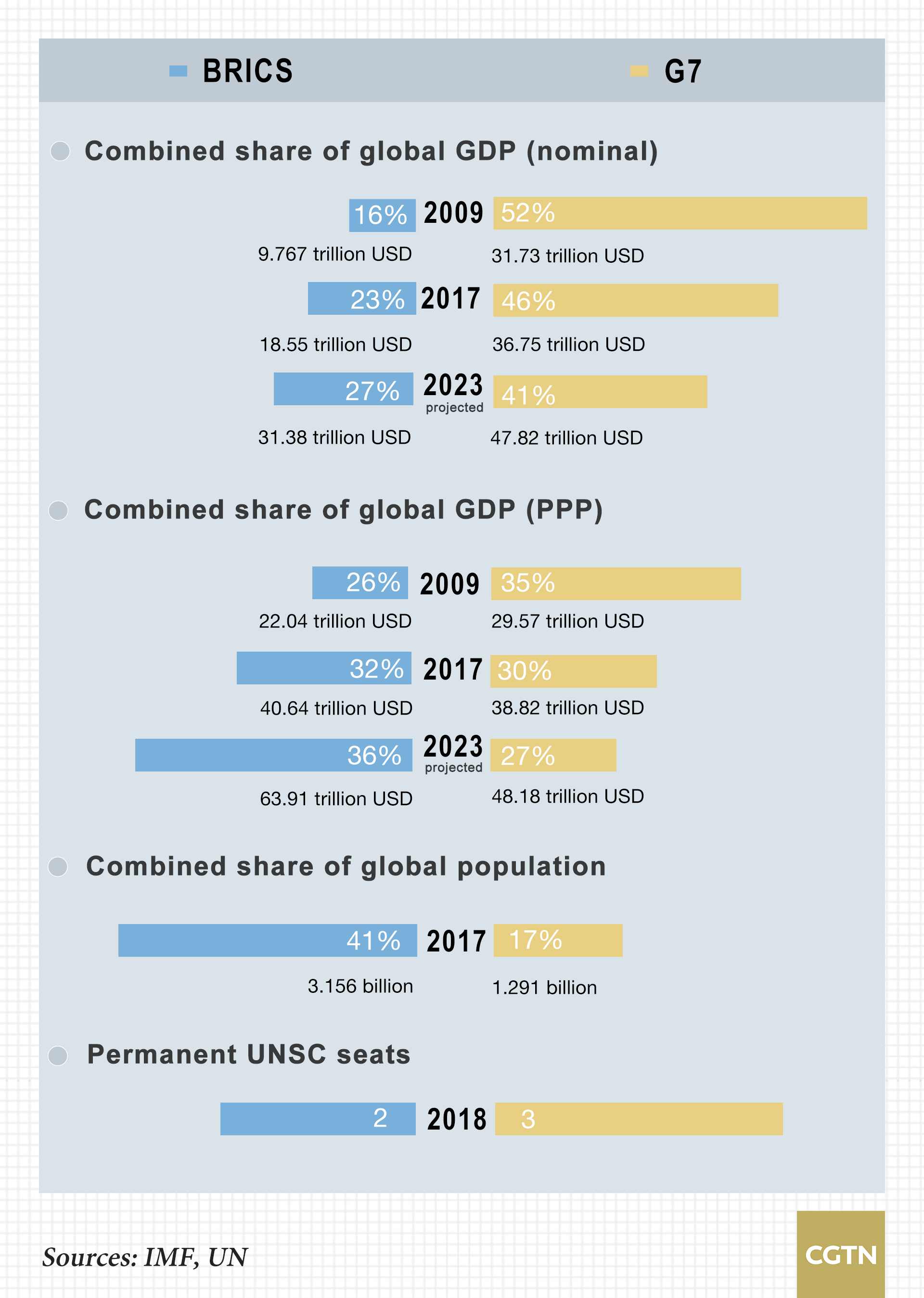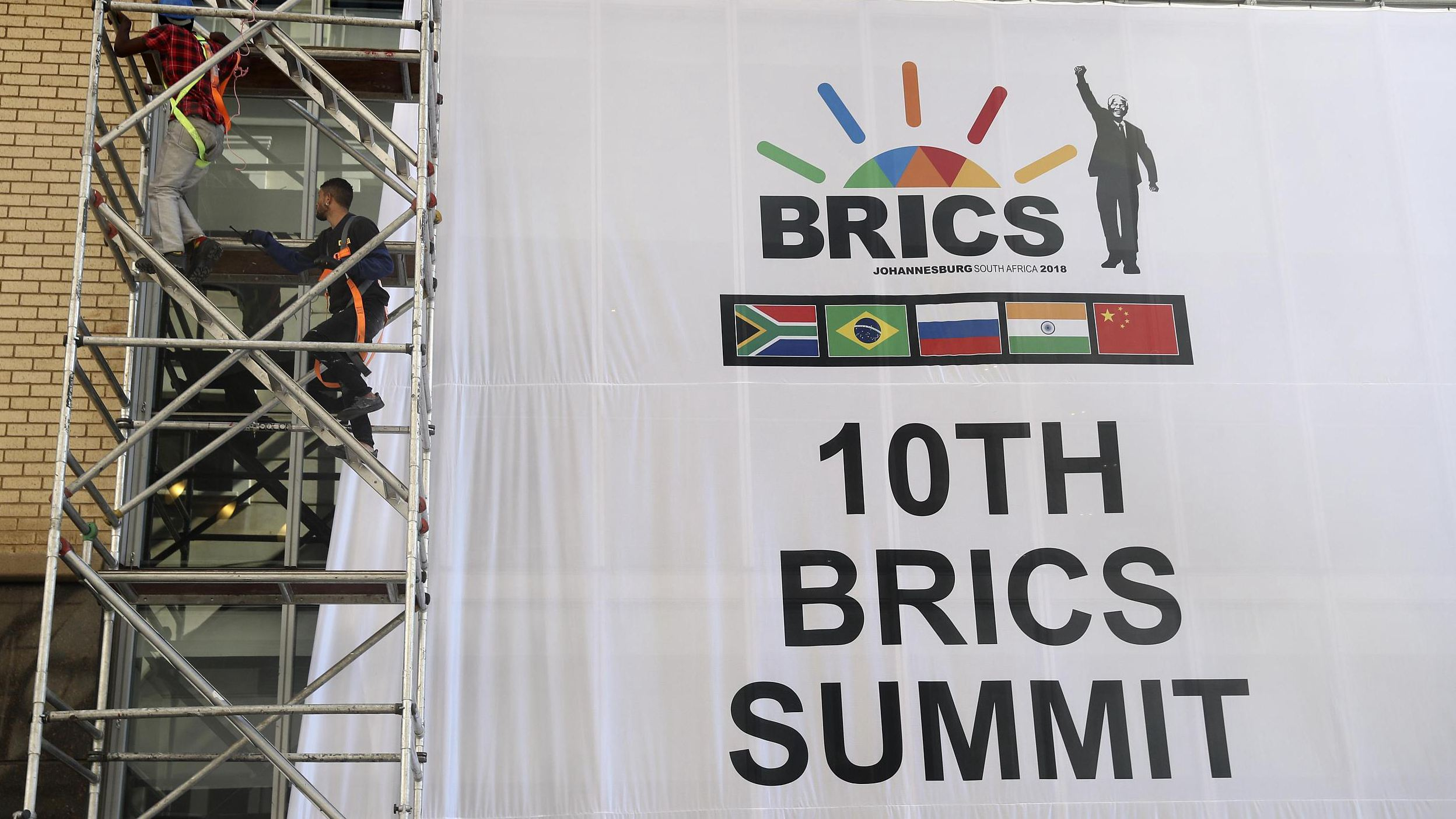Emerging versus developed; the future versus the present, or even the past. BRICS and the G7 are traditionally viewed as the newcomers and the established order.
As the clout of the BRICS nations grows, this dynamic is steadily shifting. They are increasingly, as Jiang Shixue, professor and deputy director of the Institute of European Studies at the Chinese Academy of Social Sciences, told CGTN Digital, “the same, but at the same time different.”
Same, but different
Neither group has a permanent secretariat. Both hold annual summits at the leadership level, and a host of ministerial meetings through each year.
The G7 is squarely focused on global security and trade issues; BRICS initially concentrated on an increased role in global governance, but now also incorporates an array of cultural festivals as well as sporting events and has its own financial institutions.
The "developing" and "emerging" groupings of each bloc are seen by some analysts as promoting collective decision-making, though the G7 currently has a large flaw in this regard, critics say both lack follow-through. Detractors of the G7 say to not have emerging powers at the table weakens it; and vice versa for BRICS.
So are they rivals? Not in a traditional sense. "Nowadays, in the days of globalization, countries want to cooperate by bloc," says Jiang. "BRICS I would say can challenge G7 on some issues, but not always."
Closing the GDP gap
The balance of economic power between the blocs has steadily tilted over the past decade. BRICS covers over 40 percent of the world population and around a third of its landmass, and increasingly this dominance over the G7 is reflected in the closing of the GDP gap.
The combined GDP of G7 member states made up around 46 percent of the global economy in 2017, according to International Monetary Fund figures, down from 52 percent in 2009; the aggregate GDP of BRICS nations made up 23 percent of the global economy in 2017, up from around 16 percent in 2009.
According to Jim O'Neill, the former Goldman Sachs economist who famously coined the term BRIC, the combined BRICS economies could still be on course to have larger combined GDP than the G7 by 2035 – his prediction back in 2001.
The influence of the blocs is not only felt through their economic clout, but also seats at the table of other multilateral institutions.
China and Russia are permanent members of the UN Security Council, joined by the G7’s Britain, France and the US. The position at the UN top table gives these countries the potential to act as advocates for fellow members of BRICS, and issues like cybersecurity and anti-terror cooperation are of increasing interest to the bloc.
Fists and disruption
BRICS and the G7 both seek to amplify mutual interests with a louder collective voice, despite disparities between the size of member states' economies.
China has a larger economy than Brazil, India, Russia or South Africa, for example, but BRICS institutions such as the New Development Bank (NDB) are designed so as that all countries have equal voting rights.
As Chinese Foreign Minister Wang Yi has put it, "The BRICS countries are like five fingers: short and long if extended, but a powerful fist if clenched together.”
BRICS: The BRIC acronym was famously coined by Goldman Sachs economist Jim O’Neill in 2001 to highlight the promise of emerging markets Brazil, Russia, India and China. It was not until 2009, in the wake of the global financial crisis, that the first BRIC summit was held with an initial emphasis on creating a “greater voice and representation” on global governance issues. South Africa signed up in 2011.
G7: France, Italy, Japan, the UK, the US, and West Germany formed the G6 in 1975 as a forum for the non-Communist powers to address economic issues. Canada signed up in 1976, and the EU has participated since 1981 as a “nonenumerated” member. Russia became the eighth member in 1998, but was expelled in 2014.
The same has broadly been true of the G7, though the US has been the dominant member throughout the bloc's existence. However, as with many aspects of global politics over the past two years, the new occupant in the White House has shaken the consensus.
The commitment of six of the G7 to free trade, multilateral decision-making and a coordinated response to climate change remains — but the largest economy, the US, is no longer a reliable ally on any of these issues.
Consensus has not always been found in BRICS either, but the direction of travel on key issues has remained consistent.
A fair say on governance
One of the drivers for the creation of BRICS was emerging economies not getting a fair say on issues of global governance, despite growing economic clout – many global institutions are dominated by the G7 countries which were central to creating them.
BRICS has challenged the traditions that World Bank’s president has been an American, the IMF’s managing director a European, and the developed Western economies have had the most weight in the voting and quota shares, according to the Council on Foreign Relations.
BRICS has successfully lobbied the IMF for greater voting rights for emerging economies. One of the most important advances for the bloc was the establishment of the New Development Bank – a response to slow reform of the IMF and the World Bank.
Challenges ahead
BRICS and the G7 have plenty of challenges, and one in particular in common: confronting US unilateralism.
How the G7 adapts to its dominant member espousing policies the other six members oppose is yet to be seen. An effective method of persuasion has not been found, with Trump turning hitherto allies into adversaries on trade, climate change and multilateralism.
It is also an issue for the BRICS nations, which advocate a stronger say for emerging economies in international institutions – while recognizing their importance to retaining the stability and rules-based order that fosters prosperity.
While the G7 is split on global trade, BRICS is united and ambitious. However, according to Jiang, there is a risk that that ambition could lead to a loss of focus.
"Compared with 10 years ago, BRICS is more ambitious than ever. It wants to carry out cooperation in so many areas," Jiang says. "I would say this is not good for BRICS. BRICS should pinpoint some of the most urgent areas of cooperation."
The 10th BRICS Summit takes place on July 25-27 in Johannesburg, South Africa.





